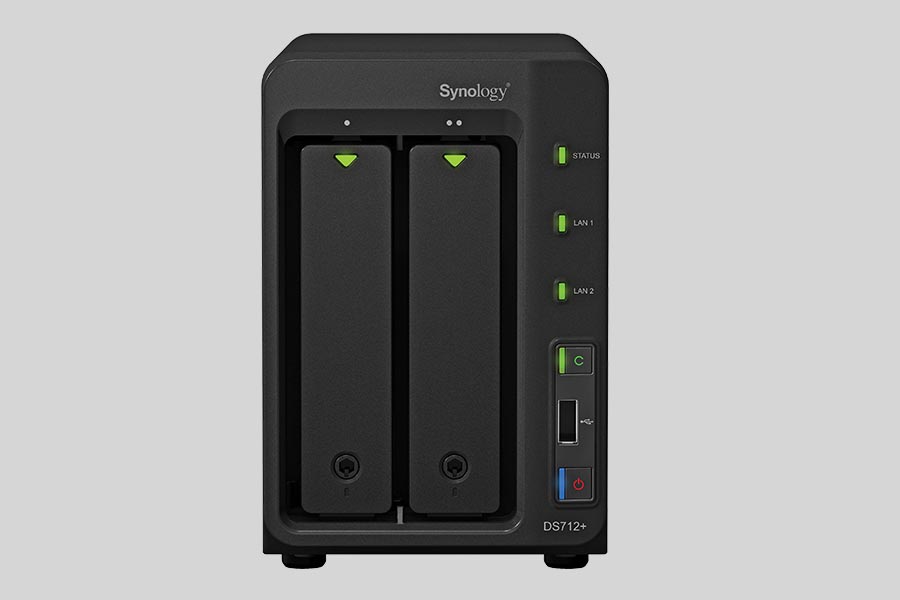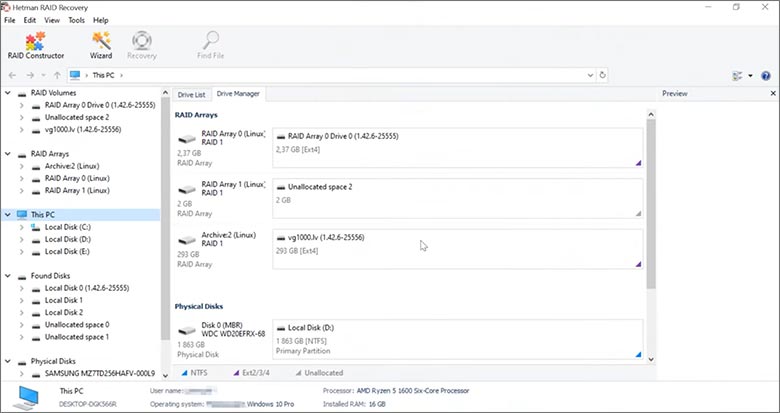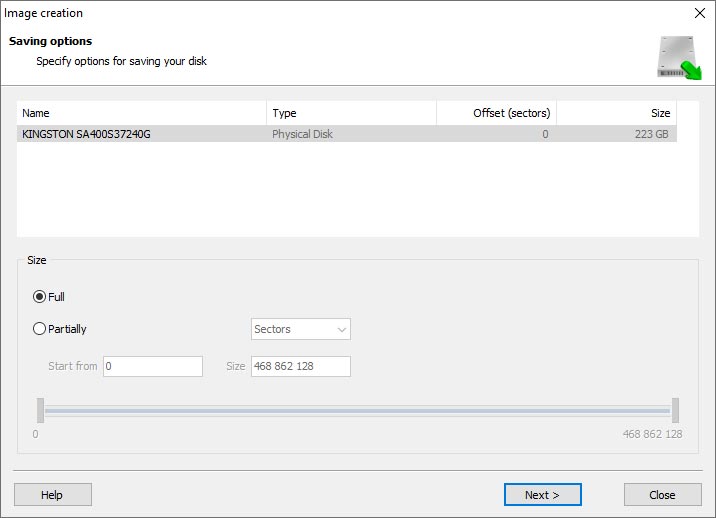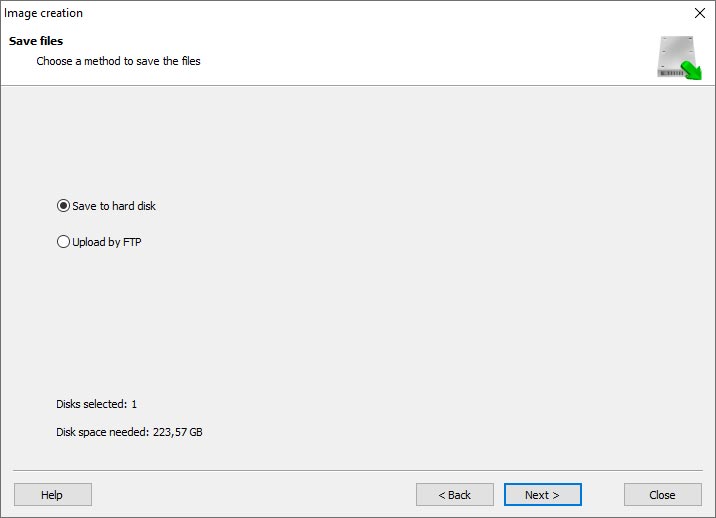
- Why Regular Data Recovery Tools Can’t Restore Files from RAID
- Key Information About the NAS Synology DiskStation DS712+
- How to Remove Hard Disks from Your NAS and Connect Them to a PC
Why Regular Data Recovery Tools Can’t Restore Files from RAID
Conventional hard drives store user data by writing it sequentially across the disk surface, which means an entire file is typically located on a single drive. In contrast, when data is written to a RAID array, each file is split into multiple fragments. These fragments are then distributed and written in sequence across all the drives in the array. Depending on the configuration, fragment sizes can range from 2 KB to 2 MB, so every file is physically stored across several disks at once.
This approach significantly increases read and write performance — after all, writing two halves of a 1 GB file to two drives simultaneously is much faster than writing the full 1 GB to a single disk. However, this same mechanism makes file recovery far more complex.
Different RAID levels use different methods to distribute and protect data. On top of that, manufacturers like Synology often add their own proprietary structures and variations. As a result, data can be written to disks in many different formats, and each requires a specific approach during recovery.
How can regular disk health monitoring and analysis help in preventing potential data loss on NAS Synology DiskStation DS712+ devices?
Regular disk health monitoring and analysis can help in preventing potential data loss on NAS Synology DiskStation DS712+ devices in the following ways:
- Early detection of disk failures: Disk health monitoring tools can constantly monitor the status of the disks in the DS712+ device. They can alert you to any signs of potential disk failures, such as bad sectors, high temperatures, or abnormal noise. By detecting these issues early, you can take proactive measures to replace the failing disk before it completely fails and causes data loss.
- SMART monitoring: The DS712+ device supports Self-Monitoring, Analysis, and Reporting Technology (SMART), which is a feature built into most modern hard drives. SMART attributes provide detailed information about the health and performance of the disks. Regular monitoring and analysis of SMART attributes can help identify any abnormalities or warning signs that indicate a potential disk failure.
- RAID array monitoring: The DS712+ supports various RAID configurations for data redundancy and protection. Disk health monitoring tools can monitor the status of the RAID array and alert you to any issues, such as degraded arrays, failed disks, or rebuilding processes. By addressing these issues promptly, you can prevent data loss and ensure the integrity of your storage system.
- Disk usage analysis: Regular analysis of disk usage can help identify potential issues that can lead to data loss. For example, if a disk is running out of space, it can cause data corruption or prevent proper functioning of the NAS device. By monitoring disk usage and taking appropriate actions, such as expanding storage capacity or moving data to other disks, you can prevent data loss due to disk space issues.
- Backup monitoring: In addition to monitoring the health of the disks, it is essential to monitor the status of your backups. Regularly check the backup schedules, verify the integrity of backup files, and ensure that the backups are running successfully. Monitoring backups can help identify any failures or issues that may prevent successful data recovery in case of a disk failure or other data loss events.
By regularly monitoring and analyzing the disk health, SMART attributes, RAID arrays, disk usage, and backups, you can proactively identify and address potential issues before they result in data loss. This helps ensure the reliability, availability, and integrity of your data on NAS Synology DiskStation DS712+ devices.
How to Remove Hard Disks from Your NAS and Connect Them to a PC
Although the NAS DiskStation DS712+ can be accessed over the network, you still need to remove its hard disks and connect them directly to a Windows PC. Only then can the recovery software properly scan and analyze the drives. Follow these steps:
-
Power off the NAS and disconnect it from the power source.
WARNING! Before removing any drives, carefully read the device manual. Improper actions may damage both the NAS enclosure and the hard disks in the RAID array.
-
Remove the hard disks one by one, gently sliding each drive out of its slot. Remember that hard disks are highly sensitive: any impact or drop can cause serious physical damage.
-
Label each hard disk according to its position inside the NAS. The order of the drives is crucial for correct RAID reconstruction.
-
Connect the drives to your computer. In this video, we explain which ports you can use to connect hard disks and what to do if your PC does not have enough free connectors.
Go to view
Step-by-Step Data Recovery with Hetman RAID Recovery

This program restores data from damaged RAID arrays and is fully compatible with Synology DiskStation DS712+. Each hard disk in the array contains technical metadata describing how files were written. When launched, Hetman RAID Recovery analyzes this metadata, automatically reconstructs the damaged array, and provides access to its contents. After that, you can browse the recovered disk and save your files. The program can also restore files that were accidentally deleted from the network drive.

How to recover data from a Synology
DiskStation DS712+ has 2 HDD slots, and it supports the following array types:
- Synology Hybrid RAID (SHR);
- RAID 1;
- RAID 0;
- Basic;
- JBOD;
NAS supports:
- EXT4;
- EXT3 (External Disk Only);
- FAT32 (External Disk Only);
- exFAT32 (External Disk Only);
- NTFS (External Disk Only);
- HFS+ (External Disk Only);
How to Safely Recover Data from Disk Images
This utility allows you to create a complete copy of a disk and work with the disk image instead of the physical drive. This approach helps protect your data from:
- Overwriting during the recovery process;
- Additional data loss caused by bad sectors;
- User errors.
To create a disk image, follow these steps:
-
Ensure you have enough free space to store the image. Its size will typically match the size of the original disk.
-
In the main window, select the target disk and choose Tools - Save Disk. You can also select multiple disks if needed.
-
When the Image Creation Wizard opens, select whether you want to save the entire disk or only a specific region. Adjust the settings and click Next.

-
Choose the directory where the image will be saved. You may select any available disk connected to your PC or upload the image via FTP.

Where Are the User’s Files Actually Stored?
The Synology DiskStation DS712+ network-attached storage keeps DSM (DiskStation Manager) operating system files on a separate RAID 1 (mirrored) array. Usually, all NAS systems create several volumes on every hard disk, and the first of them takes up to 2 Gb of space. This is where operating system files are stored. Other volumes are united into a RAID array where user’s data is written.
RAID Recovery Software: Detailed Comparison
| Product | Operating system | RAID controller support | Supported file systems | Virtual RAID controller support | Data recovery from damaged RAID | File preview |
|---|---|---|---|---|---|---|
| Hetman RAID Recovery | Windows, Linux, MacOS | Yes, over 100 controllers | FAT, exFAT, NTFS, ReFS, APFS, HFS+, Ext4, Ext3, Ext2, ReiserFS, Btrfs, VMFS, Hikvision, XFS, UFS, ZFS | Yes | Yes | Yes |
| DiskInternals RAID Recovery | Windows | Yes, over 10 controllers | FAT, NTFS, Ext2/3/4, HFS+ | No | Yes | Yes |
| R-Studio | Windows, Mac, Linux | Yes, over 20 controllers | FAT, NTFS, Ext2/3/4, HFS+ | Yes | Yes | Yes |
| UFS Explorer RAID Recovery | Windows, Mac, Linux | Yes, over 100 controllers | FAT, NTFS, Ext2/3/4, HFS+ | Yes | Yes | Yes |
| EaseUS Data Recovery | Windows | Yes, over 20 controllers | FAT, NTFS, Ext2/3/4, HFS+ | No | Yes | Yes |
| ReclaiMe Free RAID Recovery | Windows | Yes, over 100 controllers | FAT, NTFS, Ext2/3/4, HFS+ | Yes | Yes | Yes |



